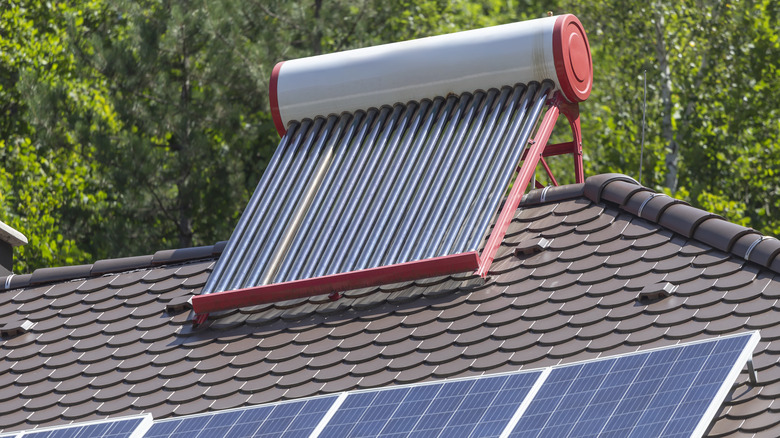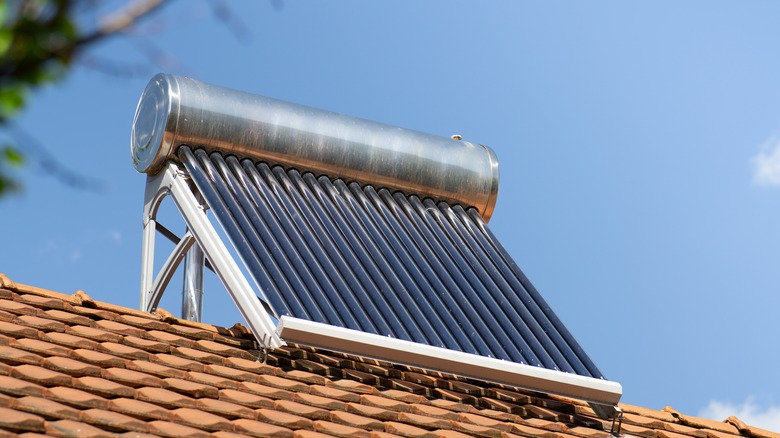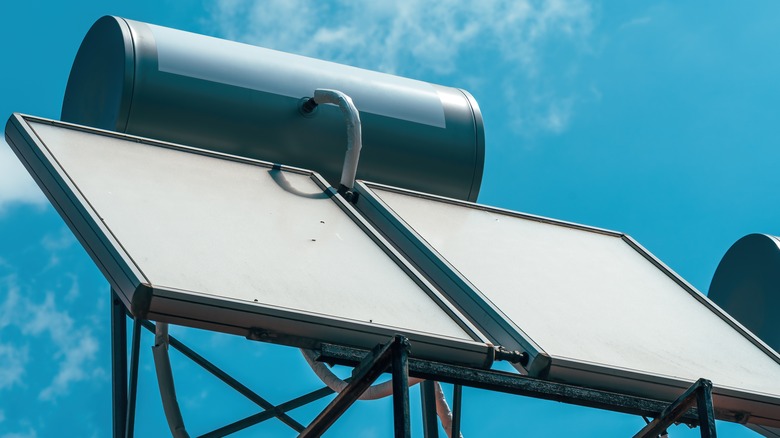Solar Water Heater: The Pros And Cons Of Using One In Your Home
Heating water is one of the most energy-consuming and costly household tasks. According to the Department of Energy, it makes up roughly 18% of a standard home's monthly energy budget. And if you use a lot of hot water, this cost can add up rather quickly. Lowering the thermostat on your water heater can help, but more and more homeowners are looking into solar water heaters and other renewable options.
Solar water heaters use collectors on the roof to capture sunlight, turn it into heat, and store it in a tank for use in the home. Depending on the system, water can be heated directly or indirectly using a transfer fluid that works even in very cold weather. These setups aren't new; they've been around for a long time in places where utility bills are high. But they're slowly making their way into American homes. The appeal is growing, given that there is a 30% federal tax credit available until 2032. As with any form of technology, there are pros and cons. Water heating through solar is beneficial for the environment and can certainly save you money in the long run, but there are also financial and practical problems to consider.
Why solar water heaters can be worth it
The most obvious advantage of solar water heating is how much money you can save. After the system has been installed, it can cover a significant portion of the gas or electricity that would normally be used to heat water, sometimes providing as much as 80% of a household's needs. Given that the sun's energy is free and that utility prices are continually rising, the savings you can make will add up considerably over a system's 20-year lifespan. Thanks to the federal clean energy tax credit, homeowners can also receive a 30% refund on installation costs.
Environmental benefits are another major positive of using solar water heaters. Whereas conventional heaters burn natural gas or use fossil-fueled electricity, solar water heaters generate hot water without any emissions at all. For households wanting to be more eco-conscious or minimize their carbon footprint, it's a no-brainer.
Solar panels are also strong. Flat-plate or evacuated tube collectors can work well for decades with little upkeep, usually only needing to be checked on and have their antifreeze replaced every now and then. Thermal water heating systems usually need less roof space to work well than solar photovoltaic panels, making them a possibility for some smaller homes. And because they deal with hot water directly, which uses a lot of energy in the home, you can feel their effects right away.
The drawbacks to consider
Even though solar water heaters have many positives, they aren't right for every home. The most important thing right now is the cost. Even with tax credits, the total cost of the equipment and installation can easily go over a few thousand dollars. That's far more than a conventional water heater, which makes the payback period a deciding factor for many buyers.
The climate you live in and how exposed your roof is to the sun are crucial factors. These systems obviously perform best in regions that receive high amounts of sun, and on top of that, your roof needs to be a suitable place to house the setup in terms of the direction it's facing and how much direct sunlight it receives. If you have a home with lots of tree coverage, a small roof, or live in a region with long winters, you'll need to think carefully about whether it's worth it, just as you'd weigh the pros and cons of installing solar panels.
Space requirements are another obstacle. Collectors and tanks need a fairly large surface area, which isn't always practical for smaller homes or apartment blocks. A final factor to consider is maintenance costs, and although maintenance may be minimal, there is still the possibility of corrosion and mineral buildup that can affect the system long-term.


